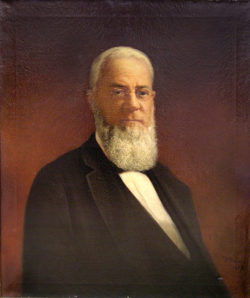John T. Ludeling
John T. Ludeling served as the chief justice of the Louisiana Supreme Court from 1868 to 1877.

Courtesy of The Law Library of Louisiana
John T. Ludeling. McConnel,Cameron (Artist)
John Theodore Ludeling was the fifth chief justice of the Louisiana Supreme Court and the first to be born in Louisiana—on January 27, 1827, in New Orleans. Ludeling served on the high bench from November 1, 1868, to January 9, 1877, under federal occupation of the state following the Civil War, which ended once Union troops were withdrawn from Louisiana upon the National Compromise of 1877. This controversial agreement allowed Republican Rutherford B. Hayes to assume the US presidency after a disputed election in return for his promise to remove federal troops from former Confederate states.
Ludeling’s parents were John Henry Ludeling, an immigrant from France, and Françoise Lorette de Salnavol, a refugee from the 1801 slave revolt in Santo Domingo. After John Henry’s death Françoise married Bernard Hemken (or Hemkin), a German immigrant who died in 1846. The family moved to Monroe while John L. Ludeling was a young boy. At age twelve he enrolled in St. Louis University in St. Louis, Missouri, and he remained a student there until 1843 but did not complete the requirements for a bachelor’s degree. Ludeling returned to Monroe, where he read law in the office of Isaiah Garrett and was admitted to the Louisiana bar. In 1855 he married Maria Copley Larkin, daughter of Enoch Copley and a descendant of the artist John Singleton Copley, according to some sources. They had four children.
Ludeling’s law practice prospered in Monroe before the Civil War. He aligned himself with the newly emerging Republican Party (unpopular in the South for its antislavery position), and, although his brothers enlisted in the Confederate army, Ludeling himself opposed secession and refused to fight against his family or his country. Ludeling’s courage and integrity earned him respect from both sides of the conflict. After the Civil War, Ludeling was elected to the 1867 Constitutional Convention; in 1868 he was appointed chief justice by the Reconstruction governor Henry C. Warmoth. Serving in the very difficult postwar period, Ludeling brought stability and integrity to the court. With the removal of federal troops from the state on January 9, 1877, Ludeling realized that his time on the Louisiana Supreme Court had come to an end.
Gov. Francis T. Nicholls’s administration was accepted as the legitimate authority in Louisiana following a disputed election against Republican Stephen B. Packard in 1876. He quickly appointed new justices to the supreme court. After retirement, Ludeling served as the first president of the Vicksburg, Shreveport, and Pacific Railroad and acquired great wealth as a major stockholder of the company. He died on January 21, 1891, at his country home, Killeden Plantation, on Bayou Desiard, near Monroe. He received a Masonic funeral service and was buried in the old City Cemetery in Monroe.
